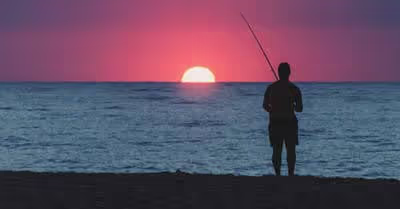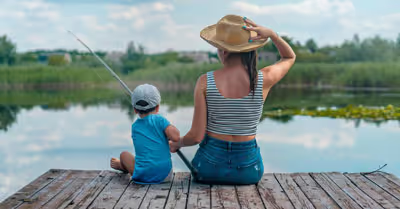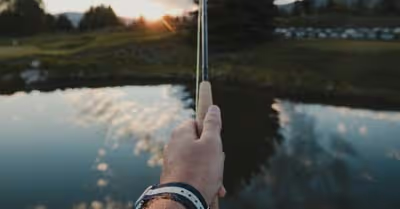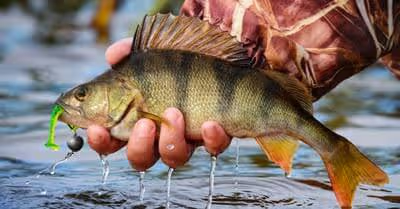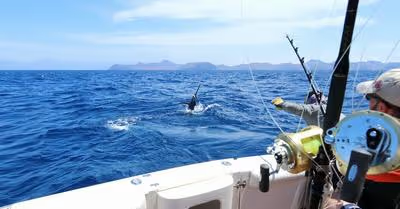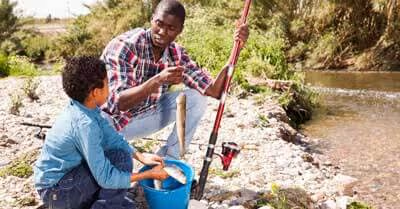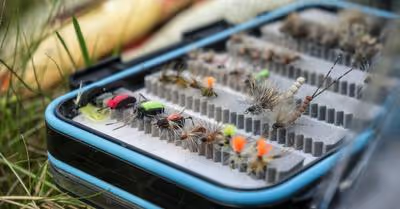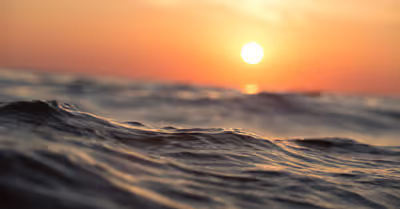Table of Contents
Choose the Right Gear
While some types of fishing gear may cost you more than $300, you don’t have to target such expensive gear if you’re still learning how to fish. The most important things are the rod, the reel, and your line. As a beginner, choose a very good line to make the learning curve a lot easier. It would be appropriate to talk to the staff at your local tackle shop or do some research to gather tips on what might work best for you.
The most important things to bring with you when learning how to fish include:
- Fishing rod – This is perhaps the most important gear
- Reel – This is the spinning mechanism that will bring fish to you when it’s hooked
- Fishing line – This is the thin string-like material that connects your rod and your hook
- Leader – Thicker than the line, it connects the line and the hook
- Rain jacket – A protective clothing just in case there’s a downpour
- Wading boots – You’ll be trudging in water easily without making your clothes wet
Learn How to Cast
The most challenging part of learning how to fish is casting. Poor casting will only translate to missed opportunities. This is why you should take it seriously and practice regularly until you become a master at it. In normal fishing, it’s appropriate to cast with the weight or the bait, lure or sinker. In fly fishing, it’s appropriate to cast with the weight of the line to make a weightless fly. Read our step by step guide on how to cast, here.
You should also know the right place to cast. For example, you can cast at about 20 feet if you’re trout fishing and may have to cast 50, 60 or 70 feet to effectively catch some fish species. It may also be hard to differentiate between a snag and a bite. To differentiate between a snag and a bite, you should steadily hold the rod with a little tension and determine whether or not there’s some sort of pounding to which you should then jerk. In most cases, many fish species will hold longer on plastic baits. This should work to your advantage in knowing whether you have a bite or it’s just a mere snag.
Here are some tips on how to cast your line
- Hold your fishing rod as if you’re shaking someone’s hand. Make sure that your thumb is on top while the rest of your fingers wrap around the rod. This is very essential in giving you a solid and relaxed grip.
- Use enough tension and force to put the cast in the back from the front. Start slowly but speed the rod as it goes back.
- You should stop when your line is completely off the surface. This is to give your line a momentum.
- Aim towards where you want to cast and move the line in a swift stroke.
- Even though the line may still be facing upward, stop your hand sharply and the line will go to where you want to cast.
- If you master these crucial casting steps, your fishing will be a lot easier and quite enjoyable.
Learn Your Lures
As a beginner, it may take some time to learn about your lures and that’s okay. The best way to learn about lures is by using different types of lures. With time, you’ll know what works best under which conditions and this will, of course, make your fishing much better. Learn how to fish with lures, here.
Where to Go Fishing
There are perhaps a lot of water bodies that can make perfect fishing spots in your local area. From the ocean, lakes, rivers to streams, you’ve got a lot of options. But as a beginner, it’s advisable to start with still waters before even attempting the more challenging deep sea fishing.
Such water bodies are usually not overcrowded and could be the perfect spots for honing your skills until you master the thrilling yet challenging art of fishing. That being said, you can try lake fishing before going to the river. This is because a lake often has a larger volume of fish than you’d normally find in a river, and this increases your chances.
Learn Fishing Etiquette
Having some proper fishing etiquette goes a long way in making your fishing experience more memorable. The most important thing is being respectful to fellow anglers, to the general environment, and to the fish you catch. For instance, it’s not appropriate to target a specific spot where a fellow angler is fishing, especially if he/she is a stranger. So if you find yourself in crowded water, consider giving a fellow angler a space of about 60 feet.
Again, it’s of great importance to strictly adhere to the leave-no-trace rule. In other words, don’t catch more than you can eat. You can also appropriately practice the catch and release technique. Last but not least, strictly observe the local fishing regulations.
Conclusion
To this end, it’s crucial to stress that learning how to fishing is not difficult. However, it’s not all about picking a fishing rod and instantly becoming excellent at it. After all, nothing worth your time works that way and fishing is no different.
Like most things in life, you’ll have to practice to become good at fishing. In addition to the right gear, casting tips, and a great fishing spot, you should learn a thing or two about fishing etiquette and you’ll be in a good place. More importantly, practice as much as you can and you’ll master this thrilling pastime.
Happy fishing!
Recent Articles



